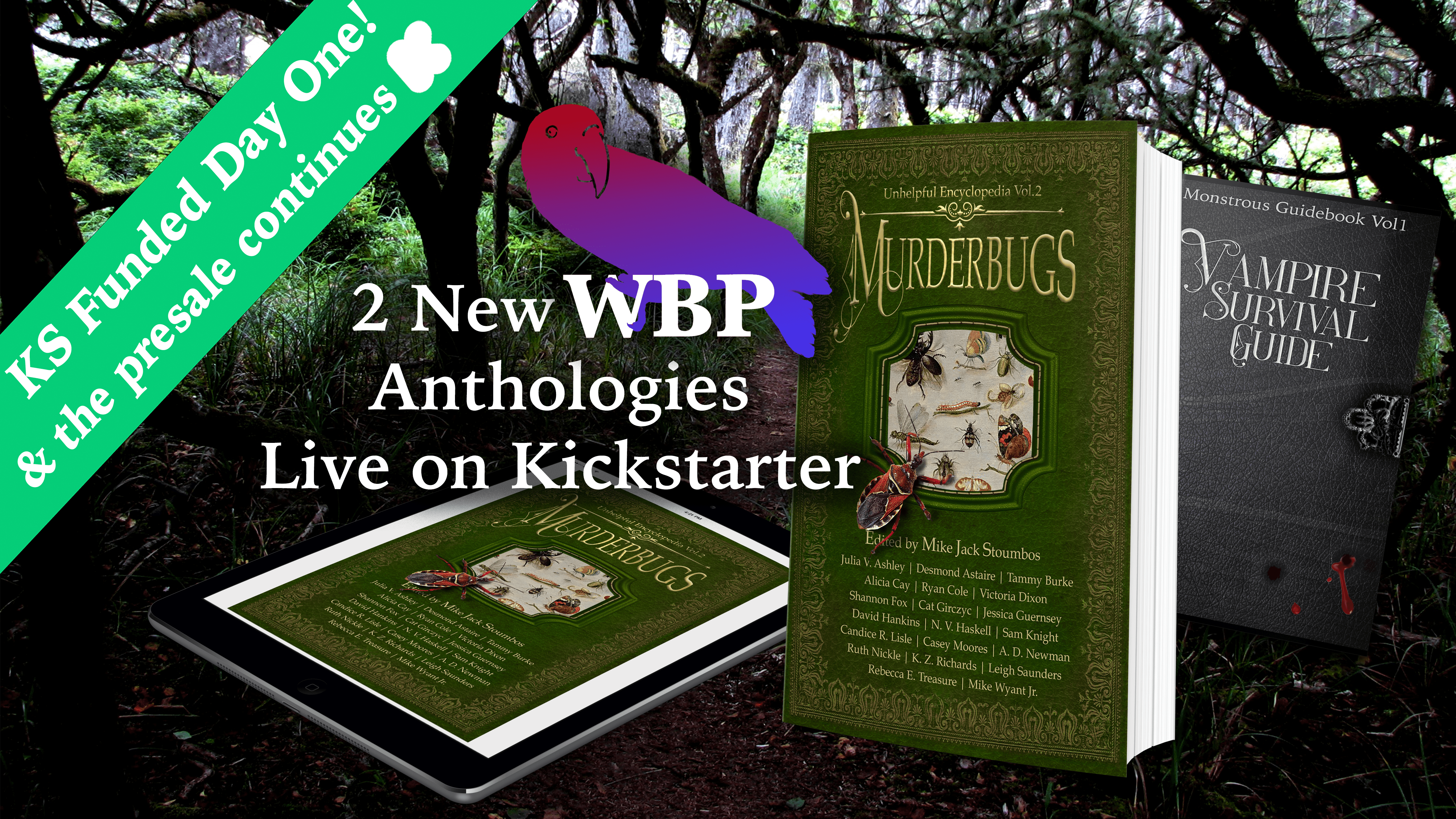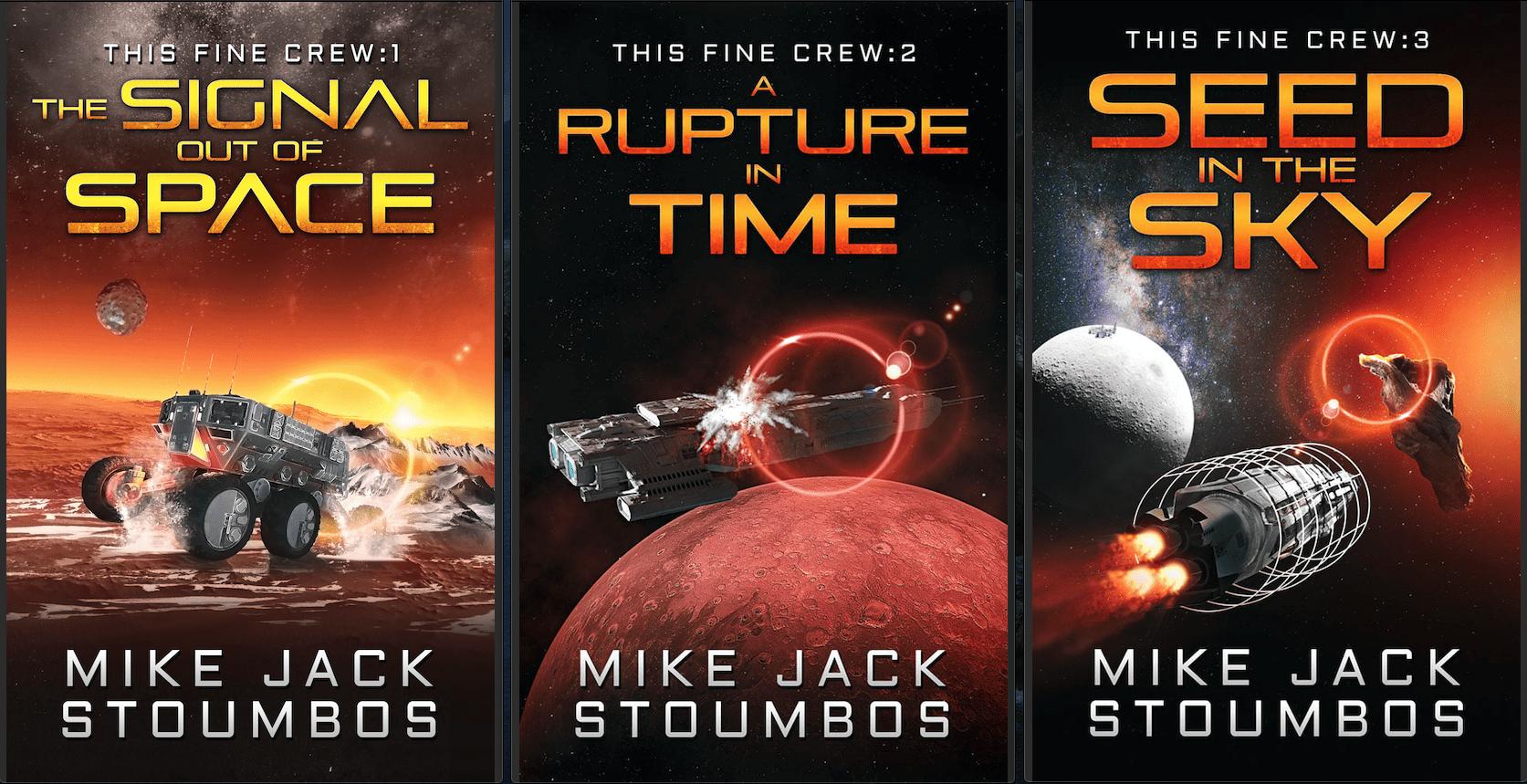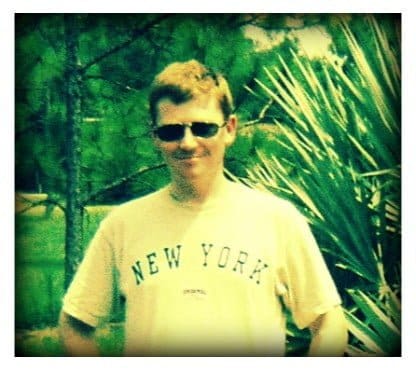Mike Jack Stoumbos & his Unhelpful Encyclopedia Series
Mike Jack Stoumbos & his Unhelpful Encyclopedia Series
By Angelique Fawns
Mike Jack Stoumbos is putting the fun back in short fiction with his Unhelpful Encyclopedia Series through WonderBird Press. A writer and curator of fantasy and science fiction, this Writers of the Future award winner is putting his unique stamp on our industry. I took one of his workshops at Fyrecon 2022, and found his approach to outlining a novel easy and understandable.
The first anthology in the Unhelpful Encyclopedia Series was Murderbirds, “a fascinating, dangerous, and often irreverent romp through the most bizarre aviary ever encountered.”
He’s currently running a kickstarter for the second installment, Murderbugs, which you can check out here: https://www.kickstarter.com/projects/mikejackstoumbos/wonderbird-press-2024-anthologies-murder-bugs-and-monsters
Or at his website www.mikejackstoumbos.com

AF: Tell us a bit about your writing journey. Do you still have a day job?
MJS: While it’s hard to sum up “the journey” succinctly, I can say that I am currently trying to focus my full-time, career energy toward writing and publishing, while gradually putting the traditional “day job” into a more part-time role that either can support or work around the author career.
I actually did the opposite for a long time: I was a public-school teacher who had read a few inspirational memoirs about teachers building up their backlog until being discovered and then surging out of the school system and onto the bestseller lists. And then I met a lot of teachers and other professionals who really wanted to be authors but sort of got stuck prioritizing the salary, then the marriage, the mortgage, the 2.5 kids and a dog, and so on and stopped making time for their passion.
Long story short, full-time, in-person teaching at a public high school was not a conducive day job for me if I wanted to write. There were many factors that went into the decision, but four years ago (summer 2019), I chose to leave the full-time world of teaching to try to treat writing as my primary work focus. A combination of substitute teaching and tutoring filled in the financial gaps without overcrowding my creative mind or energy, and I set a goal to write three novels and sell three short stories a year.
I didn’t manage it the first year, but I came pretty close and grew in the process; in fact, while I was going through a ten-short-stories-in-ten-weeks experiment, I wrote the story that would win Writers of the Future. The second, the 2020-21 school year, was a huge surge forward for me, during which I did finish three novels, each 100K to 120K, and sold enough stories that I would have “pro’d-out” of Writers of the Future eligibility had I not had a winner selected for volume 38. From there, I sold a novel trilogy which continues to expand, continued to sell short stories in scifi and fantasy collections, wrote an Amazon #1 New Release in a shared universe, and launched a publishing label to produce themed anthologies, and so on.
These days, my day job is part-time, online private school teaching, where I teach Fiction Writing, Vocabulary, and Hero’s Journey courses for high schoolers. Sometimes I supplement this with writing and editing corporate training materials—which may sound dull but pays well and, again, supports the author career rather than hinders it.
In any case, the trajectory has felt very positive, especially in the last 18 months. Votes of confidence on the Kickstarters and other projects, as well as being asked to speak at conventions, podcasts, and on interviews like this all feel like signs that my author career is heading in the right direction.
AF: What inspired the Unhelpful Encyclopedia Series?
MJS: First of all, I’ll note for anyone unfamiliar that the Unhelpful Encyclopedia series is a set of fictional anthologies. It is not a literal encyclopedia any more than Max Brooks’s World War Z is a compilation of real memoirs or Douglas Adams’s The Hitchhiker’s Guide to the Galaxy can help you hop a ride on an intergalactic cruiser—believe me, I’ve tried.
The Unhelpful Encyclopedia series was inspired in part by works like Hitchhiker, my peculiar love of creature features, and a tendency to tease out an elaborate backstory for every cautionary sign. Most people see “Don’t Feed the Ducks” and either obey or ignore it; I dream up killer gremlin-duck fantasies, which could not have possibly led to any conclusion other than a warning sign for the protection of humanity. And yet, out of the hundreds of anthologies I’d encountered, I still hadn’t seen anything quite like that.
As someone who grew up on Twilight Zone reruns, faded short-story collections, and series with “Star” in the title, I was sold on anthologies in general long before I started writing for them. As soon as I was published in my first anthology in 2016, I couldn’t help but consider the kinds of anthologies I would most want to produce. After a few years, publications, and putting in my time as a slush reader, I had a collection of collection ideas, some of which were filed under the header “unhelpful encyclopedia.”
The final ingredient needed to get this project going came in the form of Zoom calls with authors during the quarantine months. I was hosting productivity calls for writer-support networks, and I started running my anthology ideas by them as sample audiences. I’d find a way to drop themes into conversations and gauge reactions. The most laughs and off-the-cuff story ideas came when we talked about Murderbirds.
After the reception of Murderbirds, we’ve compiled stories for Murderbugs and are prepping for Murderfish. There are some what-ifs on the horizon, but they’re more than a year away, so we won’t push those just yet.
AF: What are your plans for the Monstrous Guidebook series?
MJS: The Monstrous Guidebooks are our second anthology series, which we’ll stagger with the Unhelpful Encyclopedia releases. If all goes according to schedule, our first installment, The Vampire Survival Guide will be out by the Halloween season next year.
Each of these collections will take a classic monster or cryptid and provide stories through the ages of how they survive humans—not the other way around. Essentially, if you, or someone you know, is a new vampire, hoping to survive to see 200, this book would give them the anecdotes they need from the experts.
The current plan is to start with vampires, then go to werewolves, and we’ll see which idea excites from there.
AF: Any kind of stories are you accepting/looking for with the Vampire Survival Guide?
MJS: We’re actually approaching the story selection process a little differently for this one and asking for proposals prior to stories, so we can get a sense of the styles, settings, and themes before we read (or ask people to write) full stories. After the Kickstarter completes, we’ll be going through our current proposals and submissions, and then putting out a submission call in a few author groups to fill in the gaps.
I expect to have a balance of humor, suspense, and drama among the stories, similar to the Unhelpful Encyclopedia collections. However, all stories need to conceivably exist in the same universe, which is pretty much our world with a hidden vampire element. And, each story needs to have a different lesson for vampires to learn which doesn’t conflict too heavily with any other story in the collection.
I anticipate most of the stories we’ll seek to fill the gaps would be set before the year 2000, because most we’ve seen so far have been very modern. I would like to see people have fun with their favorite pockets of history—show me a vampire in the early days of Hollywood or a vampire in the golden age of piracy.
AF: You’ve used Kickstarter successfully to fund a few projects. Any advice for success to authors wanting to run their own?
MJS: I think author and publisher Kickstarters are hard to address with any big sweeping statements. That said, I’ll caution against looking at the massive bestsellers as examples—unless you’ve already sold millions of copies, at which point, you don’t need my advice. Brandon Sanderson did something amazing, but it’s an anomaly built by his prior success and following. The methods and examples from authors with traditional publishing success who are now turning to Kickstarter are just not applicable to—if I may generalize—the rest of us.
So, if you’re not a mega-bestseller, you have to figure out what your project can offer your audience that is interesting enough to be noticed amongst the many other Kickstarters.
I focused on community building and a product that felt more alive and interactive than many set-in-stone novels. When I approached last year’s Kickstarter, I wanted to create ways to celebrate the authors involved and incorporate the overlapping indie author community. That meant also talking up other publishers and publications my authors were involved in, as well as the author education and support groups from which people submitted stories. It meant looking at things from a teaching perspective and including short story critiques from award-winning authors and editors—(we still have some left, by the way). It meant getting people excited about Tuckerizations (incorporating their name in a story) and stretch goals. This year, WonderBird Press is running our second Kickstarter, using what we learned before, and it seems to be going pretty well overall, with some things that have performed better as expected and some hurdles along the way.
It’s also a trial and error process with too many factors to effectively predict, so it helps to figure out a bare minimum, an effective measure of success, and a hopeful point of accomplishment beforehand, which you then reassess at the end.
AF: How important is art and illustration to your books?
MJS: I personally enjoy drawing concept sketches for my stories as I write them so I know what they look like. This has been a fun added bonus for readers who like to see the behind-the-scenes process, and my style worked pretty well for Murderbirds. I’m not sure if the illustrations are a major selling point for everyone, but I think they’re fun to have.
The cover design is something I often feel conflicted about, partially because I know my aesthetic preferences don’t fit the current genre norms. For Murderbirds, however, I wanted an old-fashioned, “Complete Works of Poe” looking cover with leather texture and a gold inlay façade. Add a cheesy feather with a blood splatter, and it will hopefully catch the eye. That was the first seriously indulgent cover I’ve published, brough to vivid clarity by the graphic design skills of Ruth Nickle—who also has a story in Murderbugs.
I imagine determining cover style and really anything about design comes down to how much an author wants to hold to their preferences versus how much they tailor to the trends. I don’t have a good answer for that, but I like the Unhelpful Encyclopedia style, and I think it presents the work well.
AF: If you could look back at the beginning of your writing career, what advice would you give yourself?
MJS: Write and submit more stories. I’ve given many various of this answer, but basically, it’s better to write, send, and get out of your own way. I have known so many people who talked themselves out of sending manuscripts to editors. Or, worse, they let their writing group talk them out of submitting. I’m not trying to say that new writers are perfect right out the gate—(no one is)—but I truly believe the learning process happens faster if people write and submit more stories without all of the second-guessing and polishing for the critique partners, who are well-intended but possibly completely off the mark. If we chatted further about Writers of the Future or the “Don’t Polish Off the Snags” talk, I’d go deeper into this, but I’ll cap it off with the Bradbury aphorism:
“The best hygiene for beginning writers or intermediate writers is to write a hell of a lot of short stories. If you can write one short story a week—it doesn’t matter what the quality is to start, but at least you’re practicing, and at the end of the year you have 52 short stories, and I defy you to write 52 bad ones.” ~Ray Bradbury

AF: What can we expect in the future from Mike Jack Stoumbos?
MJS: I plan to continue the two anthology series and writing my own short stories. Along with those, I’d like to start setting up other prompts for ongoing periodicals, possibly within the same vein as Unhelpful Encyclopedia or Monstrous Guidebook, but in mini categories that might not call for fifteen to twenty stories. In the last year, I’ve been laying the groundwork for a podcast series as well, which is a bigger animal than I can tackle on my own but sounds really rewarding with the right team—fingers crossed.
I have at least another two novels outlined in the THIS FINE CREW series, which I admit I’ve already back-burnered quite a bit this year, and I’ll probably continue to write in some of the Chris Kennedy Publishing shared universes like the Four Horsemen Universe from time to time. That said, I’m planning to start shifting more of my long fiction behind one to two pen names so I can keep Mike Jack Stoumbos for the teaching, editing, and publishing, but give myself opportunities to write different styles as experiments with a degree of separation.
In any case, if the first-draft process stays exciting and fun, even amidst the hard work, it will continue to feel worthwhile.
- About the Author
- Latest Posts
Angelique Fawns writes horror, fantasy, kids short stories, and freelance journalism. Her day job is producing promos and after hours she takes care of her farm full of goats, horses, chickens, and her family. She has no idea how she finds time to write. She currently has stories in Ellery Queen, DreamForge Anvil, and Third Flatiron’s Gotta Wear Eclipse Glasses. You can follow her work and get writing tips and submission hints at http://fawns.ca/.













